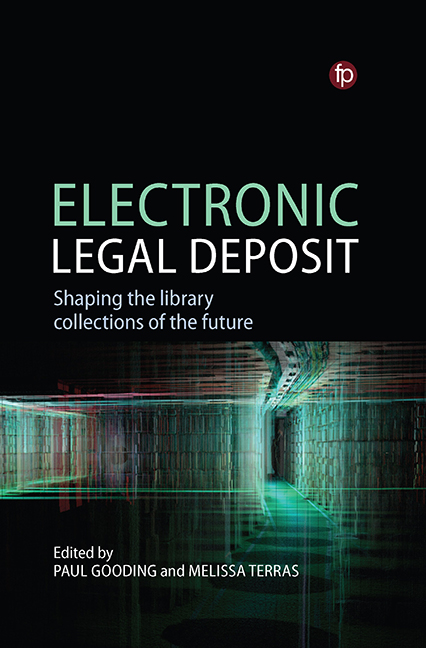Book contents
- Frontmatter
- Dedication
- Contents
- Figures and Tables
- Contributors
- Foreword
- Introduction
- PART 1 INSTITUTIONS AND IMPLEMENTATION
- 1 UK Non-Print Legal Deposit: From Regulations to Review
- 2 The Influence of Legal Deposit Legislation on the Digital Collections of the National Library Of Scotland
- 3 E-legal Deposit at the Biblioteca Nacional de México (National Library of Mexico)
- 4 Bibliographic Control in Zimbabwe: the Conundrum of Legal Deposit in the age of Digital Technologies
- 5 Electronic Legal Deposit in Sweden: the Evolution of Digital Publications and Legislative Systems
- PART 2 USERS AND CONTEXTS
- 6 Publishers, Legal Deposit and the Changing Publishing Environment
- 7 Making History: Digital Preservation and Electronic Legal Deposit in the Second Quarter of the 21st Century
- 8 Giving with one Click, Taking with the Other: Electronic Legal Deposit, Web Archives and Researcher Access
- 9 Follow the Users: Assessing UK non-print Legal Deposit within the Academic Discovery Environment
- 10 ‘An Ark to Save Learning from Deluge’? Reconceptualising Legal Deposit After the Digital Turn
- Index
9 - Follow the Users: Assessing UK non-print Legal Deposit within the Academic Discovery Environment
Published online by Cambridge University Press: 07 November 2020
- Frontmatter
- Dedication
- Contents
- Figures and Tables
- Contributors
- Foreword
- Introduction
- PART 1 INSTITUTIONS AND IMPLEMENTATION
- 1 UK Non-Print Legal Deposit: From Regulations to Review
- 2 The Influence of Legal Deposit Legislation on the Digital Collections of the National Library Of Scotland
- 3 E-legal Deposit at the Biblioteca Nacional de México (National Library of Mexico)
- 4 Bibliographic Control in Zimbabwe: the Conundrum of Legal Deposit in the age of Digital Technologies
- 5 Electronic Legal Deposit in Sweden: the Evolution of Digital Publications and Legislative Systems
- PART 2 USERS AND CONTEXTS
- 6 Publishers, Legal Deposit and the Changing Publishing Environment
- 7 Making History: Digital Preservation and Electronic Legal Deposit in the Second Quarter of the 21st Century
- 8 Giving with one Click, Taking with the Other: Electronic Legal Deposit, Web Archives and Researcher Access
- 9 Follow the Users: Assessing UK non-print Legal Deposit within the Academic Discovery Environment
- 10 ‘An Ark to Save Learning from Deluge’? Reconceptualising Legal Deposit After the Digital Turn
- Index
Summary
Introduction
It is a truth universally acknowledged that the lone search box is what all users prefer. It simplifies information seeking and retrieval by freeing users from restrictive terminology or ‘library-speak’ and by unifying a thundering herd of disparate resources, all accessible, into a single result list (Boyd et al., 2006; Lown, Sierra and Boyer, 2013; Guajardo, Brett and Young, 2017). Information seeking is simplified in the sense that users do not have to navigate different interfaces or think too deeply about search terms and search strings. Businesses developing software and especially web-based products have heeded the popularity of the apparent simplicity of search afforded by the likes of Google. They, and those they sell to, have become more data-driven, or in a mostly numeric sense, user-driven (Rodden, Hutchinson and Fu, 2010; Fabijan et al., 2017). The more customers discover and interact with their content and services, the more data gleaned, and the more competitive, profitable and responsive these companies can be (Fabijan et al., 2017). Within the discovery-access-assessment environment, this process describes a continuous feedback loop of systems-based communication – inputs and outputs – among customers, staff, and managers (Markey, Reichheld and Dullweber, 2009).
Academic libraries, in their turn, have pursued the web-based unified search environment. They have added discovery layers to local library catalogue and management systems, providing access to both popular and research resources, as well as esoteric collections. However, academic library resources and collections are not all completely web-based. Moreover, some digital collections may not be able to compete with subscription-based digital resources in ‘the familiar metrics of user experience’, including page views, repeat unique users (Rodden, Hutchinson and Fu, 2010, 2395), and more specifically for libraries, usage metrics. These metrics can range from ‘basic user surveys to the usage tracking of physical journal issues and monographs to library loan statistics’ (Glanzel and Gorraiz, 2014, 2161). Some resources, such as the UK Non-Print Legal Deposit (NPLD) collections, come with access and use restrictions that run counter to digital discovery and academic user expectation of it, proving a challenge for UK academic legal deposit libraries (Gooding, Terras and Berube, 2019).
- Type
- Chapter
- Information
- Electronic Legal DepositShaping the Library Collections of the Future, pp. 179 - 202Publisher: FacetPrint publication year: 2019



